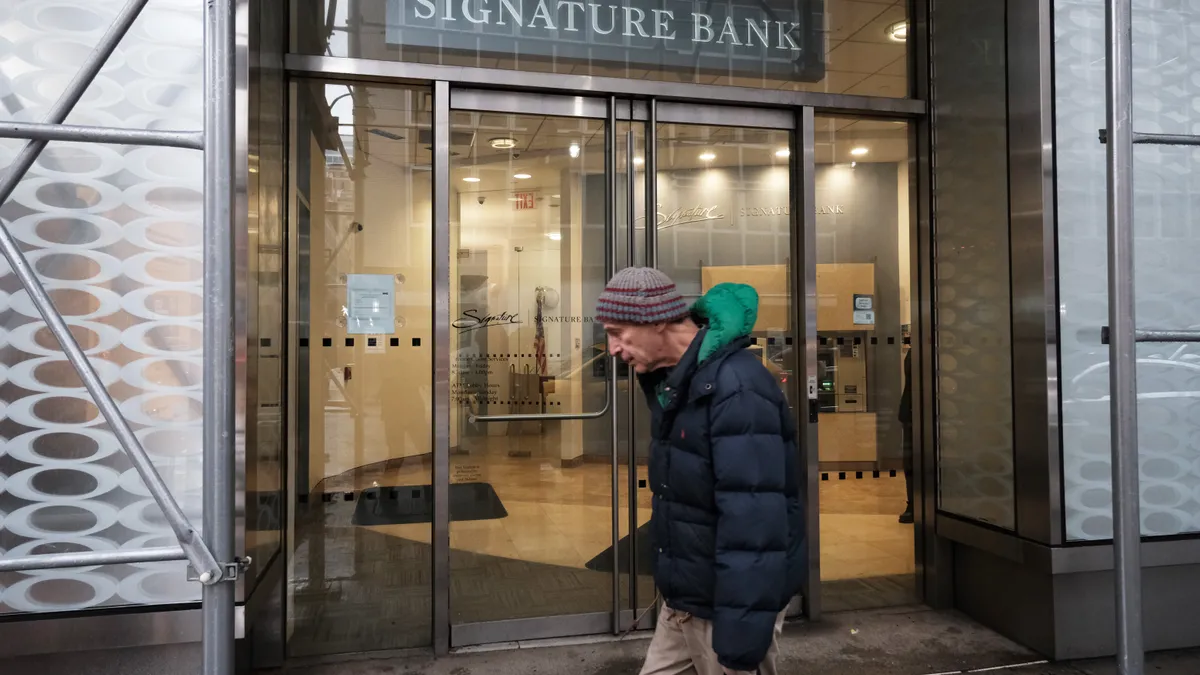New York Community Bank subsidiary Flagstar acquired a large segment of Signature Bank for $2.7 billion, NYCB and the Federal Deposit Insurance Corp. announced Sunday.
Included in NYCB’s purchase are $38.4 billion in assets, $25 billion in cash, $12.9 billion in loans, and 40 former Signature branches. Approximately $60 billion in loans remain in receivership under the FDIC.
Signature customers became Flagstar customers Monday morning, the bank said.
NYCB’s acquisition of Signature “continues [the bank’s] transformation from a predominantly multi-family lender to a diversified full-service commercial bank,” NYCB CEO Thomas Cangemi said in a prepared statement Monday. “It builds upon and accelerates the transformation set in motion by the merger of New York Community and Flagstar, and we believe the financial metrics are extremely attractive.”
Not included in the deal, however, was Signature’s $4 billion in cryptocurrency-related deposits.
Signature had been a darling in the crypto world for years. A week before Signature’s failure, crypto exchange Coinbase shifted its banking activity to Signature — where it believed its assets were safer — from Silvergate, which also shuttered this month.
Coinbase and stablecoin issuer Paxos last week revealed they had $240 million and $250 million, respectively, tied up at Signature. Defunct crypto exchange Celsius disclosed it, too, had funds tied up in the bank, but didn’t specify how much.
The FDIC said Sunday it would “provide these deposits directly to [Signature] customers whose accounts are associated with the digital banking business.”
The FDIC estimated Signature’s failure would cost the Deposit Insurance Fund roughly $2.5 billion, but the exact cost will be determined when the FDIC ends its receivership.
Following the transaction, Cangemi said, NYCB will be “even better positioned to deal with any residual market issues.”
“The deal is expected to significantly strengthen our deposit base, lower the loan-to-deposit ratio, provide the opportunity to pay down a substantial amount of our wholesale funding, and further diversify our loan portfolio away from CRE loans and more toward commercial loans,” Cangemi said.
Signature Bank was closed by its regulator, the New York State Department of Financial Services, this month “to protect depositors” following the failure of Silicon Valley Bank.
A number of Signature’s customers, concerned over the FDIC’s $250,000 limit on deposit insurance, pulled their deposits from the bank March 10. Barney Frank, a Signature board member and former Democratic congressman for whom half of the Dodd-Frank Act is named, called it “a classic case of being illiquid but not insolvent” and told the Wall Street Journal that he believed that the bank would have been fine, had regulators not shut it down.
It was the third-largest bank failure in U.S. history, and came just days after the collapse of Silicon Valley Bank, which saw $42 billion in withdrawals in one day in what House Financial Services Committee Chair Patrick McHenry, R-NC, called “the first Twitter fueled bank run.”















